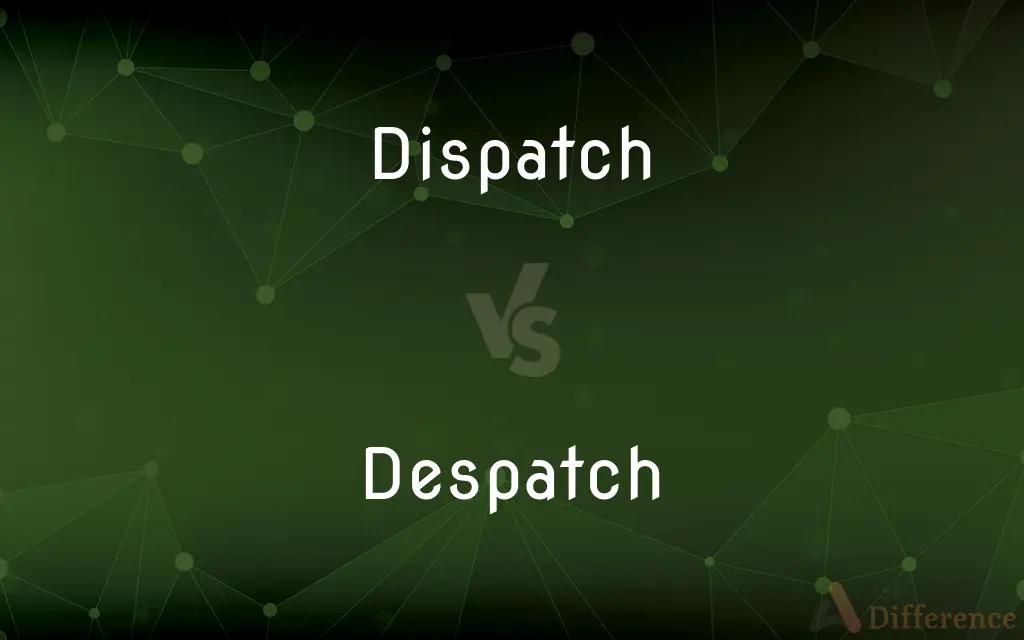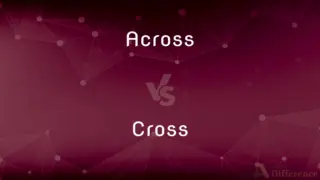Dispatch vs. Despatch — What's the Difference?
By Tayyaba Rehman — Updated on October 25, 2023
Dispatch and despatch are alternative spellings, with "dispatch" being more common in American English and both spellings used in British English. Both mean to send off or deal with in a prompt manner.

Difference Between Dispatch and Despatch
Table of Contents
ADVERTISEMENT
Key Differences
"Dispatch" and "despatch" are essentially two spellings of the same word, yet they bear subtle differences in regional usage. In American English, "dispatch" is the preferred spelling and is often used in official contexts, including journalism and business communication. Conversely, "despatch" is also found in British English, sharing space with "dispatch" in both informal and formal contexts.
The origin of both "dispatch" and "despatch" is from the Spanish word "despachar," which means to expedite or send off. Over time, as languages evolve and adapt, variations in spelling emerge. Thus, while "dispatch" and "despatch" have the same roots, regional differences have resulted in the dual spellings we see today.
Functionally, both "dispatch" and "despatch" share identical meanings. They can refer to the act of sending something or someone to a particular destination, or to complete a task quickly and efficiently. Whether you're reading a news article that discusses the "dispatch of emergency services" or a British novel referring to the "despatch of a letter," the context remains unchanged.
While "dispatch" is widely recognized in most global contexts due to the influence of American English, "despatch" remains true to its traditional British roots. Both words, regardless of spelling, are understood universally among English speakers. It's essential, however, for writers to maintain consistency in their chosen spelling throughout a piece of work.
Despite the shared meanings and origins of "dispatch" and "despatch," it's crucial for English language learners and writers to be aware of their target audience and adjust their spelling accordingly. While the difference might seem minor, attention to such details enhances clarity and ensures effective communication.
ADVERTISEMENT
Comparison Chart
Regional Usage
More common in American English.
Both spellings used in British English.
Origin
From Spanish "despachar."
From Spanish "despachar."
Function
To send off or deal with quickly.
To send off or deal with quickly.
Global Influence
Recognized globally due to American English influence.
Less global influence, more traditionally British.
Consistency
Essential to use consistently within a document.
Essential to use consistently within a document.
Compare with Definitions
Dispatch
The act of sending off something.
They await the dispatch of the package.
Despatch
Quickness and efficiency in action.
The team handled the crisis with great despatch.
Dispatch
A written message or report.
The general received a dispatch from headquarters.
Despatch
The act of sending off something.
The courier confirmed the despatch of the documents.
Dispatch
Send off to a destination or for a purpose
The government dispatched 150 police to restore order
He dispatched messages back to base
Despatch
A written communication or announcement.
He awaited the despatch from the council.
Dispatch
Deal with (a task or opponent) quickly and efficiently
The Welsh team were dispatched comfortably by the opposition
Despatch
A report sent to a newspaper or broadcasting organization.
The local journalist sent a despatch about the festival.
Dispatch
The sending of someone or something to a destination or for a purpose
A resolution authorizing the dispatch of a peacekeeping force
Despatch
"Despatch" is found in British English, sharing space with "dispatch" in both informal and formal contexts.
Dispatch
An official report on state or military affairs
In his battle dispatch he described the gunner's bravery
Dispatch
To relegate to a specific destination or send on specific business.
Dispatch
A written message, particularly an official communication, sent with speed.
Dispatch
An important message sent by a diplomat or an officer in the armed forces.
Dispatch
A news item sent to a news organization, as by a correspondent.
Dispatch
(transitive) To send (a shipment) with promptness.
Dispatch
(transitive) To send (a person) away hastily.
Dispatch
(transitive) To send (an important official message) promptly, by means of a diplomat or military officer.
Dispatch
(transitive) To send (a journalist) to a place in order to report.
Dispatch
(transitive) To dispose of speedily, as business; to execute quickly; to make a speedy end of; to finish; to perform.
Dispatch
(transitive) To rid; to free.
Dispatch
(transitive) To destroy (someone or something) quickly and efficiently.
Dispatch
To pass on for further processing, especially via a dispatch table (often with to).
Dispatch
To hurry.
Dispatch
To deprive.
Dispatch
A message sent quickly, as a shipment, a prompt settlement of a business, or an important official message sent by a diplomat, government official, military officer, etc.
Dispatch
The act of doing something quickly.
We must act with dispatch in this matter.
Dispatch
A mission by an emergency response service, typically involving attending to an emergency in the field.
Dispatch
(computing) The passing on of a message for further processing, especially through a dispatch table.
Dispatch
(obsolete) A dismissal.
Dispatch
To dispose of speedily, as business; to execute quickly; to make a speedy end of; to finish; to perform.
Ere we put ourselves in arms, dispatch weThe business we have talked of.
[The] harvest men . . . almost in one fair day dispatcheth all the harvest work.
Dispatch
To rid; to free.
I had clean dispatched myself of this great charge.
Dispatch
To get rid of by sending off; to send away hastily.
Unless dispatched to the mansion house in the country . . . they perish among the lumber of garrets.
Dispatch
To send off or away; - particularly applied to sending off messengers, messages, letters, etc., on special business, and implying haste.
Even with the speediest expeditionI will dispatch him to the emperor's cou .
Dispatch
To send out of the world; to put to death.
The company shall stone them with stones, and dispatch them with their swords.
Dispatch
To make haste; to conclude an affair; to finish a matter of business.
They have dispatched with Pompey.
Dispatch
The act of sending a message or messenger in haste or on important business.
Dispatch
Any sending away; dismissal; riddance.
To the utter dispatch of all their most beloved comforts.
Dispatch
The finishing up of a business; speedy performance, as of business; prompt execution; diligence; haste.
Serious business, craving quick dispatch.
To carry his scythe . . . with a sufficient dispatch through a sufficient space.
Dispatch
A message dispatched or sent with speed; especially, an important official letter sent from one public officer to another; - often used in the plural; as, a messenger has arrived with dispatches for the American minister; naval or military dispatches.
Dispatch
A message transmitted by telegraph.
Dispatch
An official report (usually sent in haste)
Dispatch
The act of sending off something
Dispatch
The property of being prompt and efficient;
It was done with dispatch
Dispatch
Send away towards a designated goal
Dispatch
Complete or carry out;
Discharge one's duties
Dispatch
Dispose of rapidly and without delay and efficiently;
He dispatched the task he was assigned
Dispatch
A report sent to a newspaper or broadcasting organization.
The foreign correspondent sent a dispatch from the war zone.
Dispatch
Promptness and efficiency in performance or transmission.
She handled the task with dispatch.
Common Curiosities
Do they have the same meaning?
Yes, both words essentially mean to send off or deal with in a prompt manner.
Can I use dispatch and despatch interchangeably in a document?
It's best to choose one spelling and use it consistently in a single document.
Is despatch considered incorrect in American English?
While not incorrect, "dispatch" is the preferred spelling in American English.
Which word originated first?
Both words have their origins from the Spanish word "despachar."
Which is more common: dispatch or despatch?
"Dispatch" is more common in American English, while both spellings are used in British English.
Is one spelling more formal than the other?
Neither spelling is inherently more formal; it's more about regional preference.
How do newspapers typically spell it?
In the U.S., newspapers typically use "dispatch." In the U.K., either spelling might be used.
Why are there two spellings?
Variations in spelling can emerge over time due to linguistic evolution and regional differences.
In what contexts are these words most often used?
They're often used in contexts involving sending, communication, and completing tasks promptly.
Are there any synonyms for dispatch and despatch?
Yes, synonyms include "send," "transmit," and "expedite."
Are there other words with similar dual spellings?
Yes, like "color" (American English) and "colour" (British English).
Can both words be used as nouns and verbs?
Yes, both "dispatch" and "despatch" can be used as nouns and verbs.
Do both words have the same grammatical rules?
Yes, "dispatch" and "despatch" follow the same grammatical rules.
Is the pronunciation different between the two?
No, both words are generally pronounced the same way.
If I'm writing for a global audience, which spelling should I use?
"Dispatch" is more widely recognized globally due to the influence of American English.
Share Your Discovery

Previous Comparison
Eat vs. Devour
Next Comparison
Across vs. CrossAuthor Spotlight
Written by
Tayyaba RehmanTayyaba Rehman is a distinguished writer, currently serving as a primary contributor to askdifference.com. As a researcher in semantics and etymology, Tayyaba's passion for the complexity of languages and their distinctions has found a perfect home on the platform. Tayyaba delves into the intricacies of language, distinguishing between commonly confused words and phrases, thereby providing clarity for readers worldwide.
















































